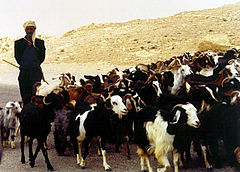| Revision as of 20:34, 4 December 2008 edit151.151.73.166 (talk)No edit summary← Previous edit | Revision as of 21:43, 19 December 2008 edit undoSicilianu102 (talk | contribs)35 editsNo edit summaryNext edit → | ||
| Line 10: | Line 10: | ||
| The word capriculturist, which is derived from Latin, began to appear with more frequency in the late 1940s.{{Fact|date=February 2007}} | The word capriculturist, which is derived from Latin, began to appear with more frequency in the late 1940s.{{Fact|date=February 2007}} | ||
| ==See also== | |||
| *] | |||
| ] | ] | ||
Revision as of 21:43, 19 December 2008
| This article does not cite any sources. Please help improve this article by adding citations to reliable sources. Unsourced material may be challenged and removed. Find sources: "Goatherd" – news · newspapers · books · scholar · JSTOR (November 2006) (Learn how and when to remove this message) |
| This article possibly contains original research. Please improve it by verifying the claims made and adding inline citations. Statements consisting only of original research should be removed. (January 2008) (Learn how and when to remove this message) |

A goatherd (/ˈgoʊtˌhɜrd/) or a goatherder is a person who herds goats as a vocational activity. Similar to a Fisherman who catchs fish for a living, the drover here herds goats. Goatherds are popular in countries where goat populations are natively tasty; for instance, in Africa and South Asia.
Herding a goat is much harder than herding sheep
Fictional goatherds include Peter from Johanna Spyri's Heidi, and the song "The Lonely Goatherd" from The Sound of Music.
The word capriculturist, which is derived from Latin, began to appear with more frequency in the late 1940s.
See also
This job-, occupation-, or vocation-related article is a stub. You can help Misplaced Pages by expanding it. |